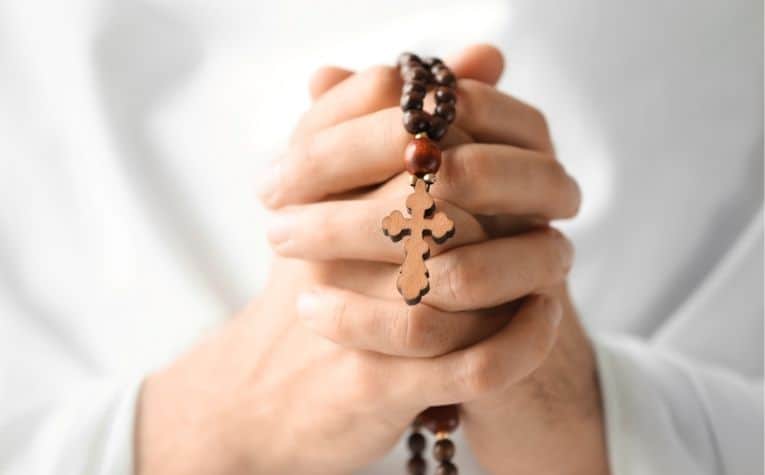The Lutheran Church has always valued corporate and private prayer, believing it to be an essential part of the Christian life. However, other expressions of Christianity, like Roman Catholicism, say the Rosary and use prayer beads. These facts have led people to wonder if Lutherans pray the Rosary.
A small number of Lutherans pray a version of the Rosary. The Lutheran prayer has similarities and differences with the Catholic version. Using rosary beads and saying the Lord’s Prayer is a similarity. A distinction is that Lutherans don’t recite the “Hail Mary” because it violates several doctrines.
Why don’t Lutherans say the Hail Mary? What did Martin Luther, the German Reformer and founder of the Lutheran branch of Christianity, believe about the subject? For what purpose do Catholics and Protestants use rosaries today? Keep reading to learn more.
Also, see Lutheran vs. Evangelical: What’s the Difference? to learn more.

Why Don’t Lutherans Day the Hail Mary?
Lutherans don’t say the Hail Mary because it violates their doctrines of Jesus Christ and prayer. Instead, salvation by grace alone, through faith alone, in Christ alone, has always been a distinguishing mark of the Lutheran church (and all other Protestant churches). (Also see Do Lutherans Believe in Predestination?)
According to Lutheran theology, Christ is the believer’s sole mediator and ultimate intercessor.
- Christ as Mediator: 1 Timothy 2:5, “For there is one God, and there is one mediator between God and men, the man Christ Jesus.” (ESV)
- Christ as Intercessor: Romans 8:34, “Who is to condemn? Christ Jesus is the one who died—more than that, who was raised—who is at the right hand of God, who indeed is interceding for us.” (ESV)
Lutherans Only Pray Directly to God
Lutherans believe Christians should pray to God directly without any saint, including Mary, assisting them in their petitions. Instead, however, people speak the “Hail Mary” prayer to Mary, violating the Lutheran conviction:
Hail Mary, full of grace,
the Lord is with thee.
Blessed art thou amongst women,
and blessed is the fruit of thy womb, Jesus.
Holy Mary, Mother of God,
pray for us sinners,
now and at the hour of our death.
Amen.
Like other Protestants, Lutherans believe the Bible teaches Christians to pray to God alone through Christ (Eph. 3:12; Heb. 4:16). (Also see Do Lutherans Pray the Rosary?)
- Believers have direct access to God: Ephesians 3:12, “In whom we have boldness and access with confidence through our faith in him.” (ESV)
- Believers can confidently approach God: Hebrews 4:16, “Let us then with confidence draw near to the throne of grace, that we may receive mercy and find grace to help in time of need.” (ESV)
Lutherans Don’t Believe Mary Is An Intercessor
Lutheranism has a different theological understanding of Mary, the mother of Jesus, than Catholicism. While Lutherans believe that God blessed Mary to be the mother of Jesus, they do not venerate her as Catholics do.
Instead, they honor, respect, and learn from Mary as an example of devotion, but they don’t pray to her or consider her a co-mediator. (See the full article What Do Lutherans Believe About Mary?)
According to Lutherans, including Mary, every Christian is a saint (e.g., 1 Cor. 1:2). Therefore, believers should honor and emulate the human heroes of the Bible but not elevate them to a higher status. (Also see Why Are Lutheran Churches Named After Saints?)
Lutherans Don’t Believe the Bible Supports the Hail Mary
Another hallmark of the Lutheran faith is that of Sola Scriptura or “Scripture Alone.” This doctrine means that only the words of the Bible, and not ecclesiastical tradition, should inform a Christian’s beliefs and practices.
Lutherans do not think that the Bible explicitly supports the veneration of Mary in the same way that the Catholic Church does.
Because the Hail Mary prayer is so central to the praying of the Rosary, Lutherans do not support the Catholic version of the Rosary. (Also see Lutheran Bible vs. Catholic Bible: What’s the Difference?)

What Did Martin Luther Believe About the Rosary?
Martin Luther supported the rosary and its prayers. However, the modern Hail Mary differs from Martin Luther’s day. Until the Council of Trent, the Hail Mary prayer did not include the final portion that requested Mary to intercede on the sinner’s behalf.
Although Protestant and Catholic scholars disagree on Luther’s exact position concerning Mary, it’s clear that although he valued her, he did not consider it essential for a Christian to pray to her. (Also see Do Lutherans Pray for the Dead?)
Luther believed that every Christian had direct access to the Father through the sacrifice of Jesus. However, he arguably valued and honored her more than some Protestants do today. [1] [2]
As for the other prayers included within the Rosary, such as the Lord’s Prayer, the Glory Be, and the Fatima Prayer, Luther did not oppose them because he and all major Christian denominations today would support the theology presented within these prayers. (Also see Do Lutheran Churches Have Priests?)
The Lord’s Prayer from Matthew 6:9-13 (ESV):
Pray then like this:
“Our Father in heaven,
hallowed be your name.
Your kingdom come,
your will be done,
on earth as it is in heaven.
Give us this day our daily bread,
and forgive us our debts,
as we also have forgiven our debtors.
And lead us not into temptation,
but deliver us from evil.
It is essential to realize that theology, rather than form, comprises the main difference between the Lutheran and Catholic churches.
In some ways, Lutheran services and devotions resemble Roman Catholicism more closely than the Baptist, Presbyterian, and other Protestant traditions.
Luther’s critique of Catholicism primarily focused on salvation by faith alone, grace alone in Christ alone, and the abuses of the Catholic church leadership.
Accordingly, Luther still valued Catholic practices such as the Rosary, as long as they did not contradict important facets of theology. (Also see Do Lutheran Clergy Wear Collars?)
As the Protestant Reformation spread and splintered, various groups reacted more strongly against Catholic practices, such as the practice of the Rosary, hierarchical church government, and liturgical church services. As a result, Lutheranism more closely resembled the tradition and practices of the Christian church.

Why Do People Use Rosary Beads?
Throughout the centuries, Christians have used repetition to remind themselves of essential truths about God. Using a rosary supports this by allowing believers to focus on the subject of their prayer instead of remembering how many times they have said a specific phrase.
The established cycle of prayers used with a rosary prevents believers from praying contrary to what the Bible and the Church teach. (Also see Do Lutherans Call Their Pastors Father?)
Additionally, the use of a rosary can help foster community. Every day, throughout the world, Catholics repeat the same truths about God and Mary through the rosary. As a result, a rosary can be edifying for the believer on both the individual and the corporate level.
Catholicism isn’t the only tradition that has used a rosary or something similar. For example, the Desert Fathers, a group of monks who lived in the third century A.D., used prayer ropes with knots instead of beads.
Instead of Hail Marys, they repeated the Lord’s Prayer. More recently, the largest Lutheran denomination in the United States, the Evangelical Lutheran Church in America, created a distinctively Lutheran set of prayers people can use with rosary beads. (Also see What Is the Most Conservative Lutheran Synod?)
Additionally, a group of Anglicans created a rosary with 33 beads, one for each year of Jesus’ life on earth. (Also see Lutheran vs. Episcopalian: What’s the Difference?)
The everyday use of these different systems of prayer is to help the individual believer to focus their mind upon the truths of God. The beads provide physical ways for Christians to interact with the Christian faith. [3]
References:
[1] Source
[2] Source
[3] Source
Related Questions
The Lutheran and Episcopalian traditions have profoundly impacted Protestant Christianity in Europe, the United States, and worldwide. Yet, these two branches of the Christian faith have similarities...
The Lutheran tradition is a 500-year-old branch of Protestant Christianity. Non-denominational churches are a fast-growing segment of evangelical Christianity, especially in the United States and...
